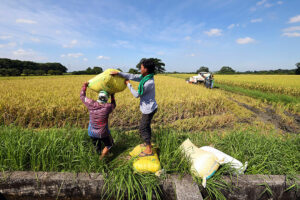A FARMER’S group has renewed its call to repeal a law that liberalized rice imports and made local traders pay a 35% tariff on grain, citing the need to reduce the country’s reliance on imports.
“The entire rice industry suffers an immeasurable loss due to the low farm gate price of rice caused by the large volume of imports,” Bantay Bigas Spokesperson Cathy L. Estavillo said in a Viber message in Filipino at the weekend.”It’s pointless (imports) because it did not lower the price of rice.”
The Senate last week approved on second reading a bill that seeks to raise yearly allocations for the Rice Competitiveness Enhancement Fund (RCEF) under the Rice Tariffication Law of 2019 to P30 billion from P10 billion until 2031.
Under Senate Bill No. 2779, the Department of Agriculture (DA) will be powered to declare a food security emergency due to shortages or “extraordinary” increases in rice prices.
In emergencies, the agency may sell the National Food Authority’s (NFA) rice reserves in areas suffering from shortage or “extraordinary” high prices of the grain, replenish the inventory with domestic rice and import rice if no domestic grain is available.
The higher funding for RCEF will be used for equipment to grow high quality inbred rice seeds, cash aid for farmers and the construction of solar-powered irrigation systems, among other farming technologies, according to the Senate bill.
“We should not only focus on tax collection; instead, we must resolve the issue of the Philippines being the number one rice net importer for the past three years under the Rice Tariffication Law,” Ms. Estavillo said.
The Philippines is likely to be the world’s top rice importer this year and next year, according to the US Department of Agriculture.
The House of Representatives approved its version of the measure in May, which seeks to restore the National Food Authority’s power to import rice during national emergencies. House Bill No. 10381 increased RCEF to P15 billion from P10 billion.
The Agriculture secretary may designate the importing entity, while the NFA remains barred from importing rice.
“The Senate version is far better than the House version,” former Agriculture Undersecretary Fermin D. Adriano said in a Viber message. “The challenge now is how to allocate RCEF in a more judicious and efficient manner.”
President Ferdinand R. Marcos, Jr. earlier signed Executive Order No. 62, which reduced tariffs on imported rice to 15% from 35% until 2028 to lower the price of the grain.
Last week, Agriculture Secretary Francisco P. Tiu Laurel, Jr. said the agency is not keen on recommending to raise tariffs on imported rice since retail prices have not gone down.
Imported and local well-milled rice in Metro Manila markets was being sold for P47-55 a kilo, according to DA’s price monitor as of Sept. 5. Local regular-milled rice was being sold for P43-50 a kilo, while imported regular-milled rice was P47-50 a kilo.
“It is difficult to rely on the available stock in the world market because prices are very volatile,” Ms. Estavillo said. “It is necessary to restore the mandate of the NFA to regulate rice prices.” — John Victor D. Ordoñez

